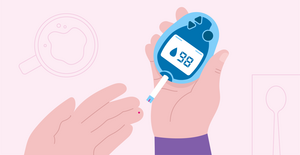Hepatitis Testing
Hepatitis is a general term that refers to inflammation of the liver. This inflammation can be caused by many factors, including some viral sexually transmitted infections (STIs). Hepatitis B and hepatitis C can be spread among sexually active people, but millions of Americans are unaware that they have a viral hepatitis infection. Hepatitis can have health consequences if not detected, but testing for hepatitis can help keep you safe and on top of your health.
Here’s a primer on hepatitis testing, including types of hepatitis tests, what to expect during a hepatitis test, and frequently asked questions.
Who should be tested for hepatitis?
It can be difficult to know if you should be tested for hepatitis, particularly because hepatitis B and hepatitis C infections often have no symptoms. To address this, the US Centers for Disease Control and Prevention (CDC) has created universal testing recommendations.
The CDC recommends that you get tested for hepatitis C if:
- You’re an adult over age 18. This universal screen should occur once a lifetime unless you live in an area where the prevalence of hepatitis C is very low (less than 0.1%).
- You’re a pregnant woman. This screen should occur with each pregnancy unless you live in an area where the prevalence of hepatitis C is very low (less than 0.1%).
- You have recognized conditions or exposures to hepatitis C (such as having an organ transplant or blood transfusion before 1992, having been in close contact with someone with hepatitis C, having a sexually transmitted infection, or being a man who has sex with men).
- You have ongoing risk factors (such as being HIV positive, receiving dialysis, having a job that exposes you to hepatitis, or injecting or inhaling illicit drugs).
- You would like to request testing for any reason.
According to the CDC, you should be screened for hepatitis B if you are part of a special population, such as having been born in a country with a prevalence of hepatitis B greater than 2 percent, being unvaccinated, being HIV positive, being on immunosuppressant medications, or being pregnant. However, the CDC is currently reviewing universal recommendations for hepatitis B testing, so hepatitis B testing may be expanded soon. If these recommendations are approved, they will include:
- Universal hepatitis B screening for adults over age 18, once in a lifetime.
- Using three types of blood tests to screen for hepatitis B based on the virus’ infection characteristics.
- Testing periodically for people with ongoing risk factors.
- Testing for anyone who would like to request testing for any reason.
How to get tested for hepatitis
A common way to get tested for hepatitis is to visit a healthcare provider. During your visit, your healthcare provider may ask questions about your medical history, including other health conditions you may have or any history of drug use or blood transfusions. It will also be important to discuss your sexual history, including if you have had multiple sexual partners or if you engage in high-risk sexual activity, as these factors can increase your likelihood of being exposed to hepatitis B or hepatitis C.
Depending on your conversation, your healthcare provider may recommend testing for hepatitis B, hepatitis C, or both. It is also common for a healthcare provider to recommend testing for other types of infections that can occur along with hepatitis infection, such as HIV or syphilis. If you have concerns that you have been exposed to a sexually transmitted infection like hepatitis B or hepatitis C, you may also want to consider testing for other STIs, such as gonorrhea or chlamydia, as well.
What to expect during a hepatitis test
A hepatitis test is done using a blood sample. During a hepatitis test, a healthcare provider will use a small needle to remove blood from your vein. Then, a bandage will be placed over the area where the needle was inserted.
According to the CDC, a hepatitis test looks for indications in your blood that you have an active hepatitis infection, a chronic hepatitis infection, or a past hepatitis infection. Hepatitis infection can be detected in your blood via two types of proteins, called antigens and antibodies. Antigens are proteins that are present in the viral cells themselves. If antigens are detected in your blood, it means you have an active or chronic infection. Antibodies are cells made by your immune system to help defend against viral invaders. If you have hepatitis antibodies present, it may mean you have an active infection, a past infection, or that you’ve received a hepatitis vaccine.
Testing positive for hepatitis
If you test positive for hepatitis, it means that the blood specimen that your healthcare provider collected showed signs that you either have had hepatitis in the past or you currently have hepatitis, the CDC notes. Sometimes, a vaccine will make you test positive for one hepatitis test, but all others will be negative. According to the CDC, this means that you do not have a hepatitis infection and have not had one in the past. Hepatitis test results can be difficult to interpret, which is why it is essential that you discuss with your healthcare provider the meaning of your specific test results.
If you test positive for hepatitis infection, a healthcare provider may recommend further testing to get more information. This may include another blood test, an imaging test, or a liver biopsy. Depending on your test results and overall medical history, you may need treatment with an antiviral medication. These medications can cure hepatitis in some cases and help you avoid the future consequences of an untreated hepatitis infection, such as liver inflammation, liver cancer, or liver failure, according to the CDC.
When you are discussing treatment for hepatitis infection, a healthcare provider may refer you to a specialist who helps people manage this chronic condition. It will be important to take the full course of any medications you’re prescribed to ensure that your body has the tools it needs to fight the infection. Your sexual partner or partners should also be informed that you are positive for hepatitis B or hepatitis C so that they can also get a hepatitis test and have access to treatment if needed.
Find Hepatitis Testing near you
- Alabama
- Alaska
- Arizona
- Arkansas
- California
- Colorado
- Connecticut
- Delaware
- Florida
- Georgia
- Hawaii
- Idaho
- Illinois
- Indiana
- Iowa
- Kansas
- Kentucky
- Louisiana
- Maine
- Maryland
- Massachusetts
- Michigan
- Minnesota
- Mississippi
- Missouri
- Montana
- Nebraska
- Nevada
- New Hampshire
- New Jersey
- New Mexico
- New York
- North Carolina
- North Dakota
- Ohio
- Oklahoma
- Oregon
- Pennsylvania
- Rhode Island
- South Carolina
- South Dakota
- Tennessee
- Texas
- Utah
- Vermont
- Virginia
- Washington
- Washington DC
- West Virginia
- Wisconsin
- Wyoming
Hepatitis Testing FAQs
Why is it important to get tested for hepatitis?
It’s important to get tested for hepatitis so that you can begin treatment. The CDC notes that most cases of hepatitis C, treatment can get rid of the infection and prevent you from experiencing the consequences of an untreated hepatitis infection, such as liver failure, liver inflammation, or even liver cancer. Treatment for hepatitis B can also help keep your liver healthy.
How is a hepatitis infection treated?
Hepatitis infections are treated with antiviral medications, notes the CDC. For a hepatitis C infection, medications are typically taken over a series of several weeks. For a hepatitis B infection, medications are not always needed. If your healthcare provider does prescribe a medication, you may need to take it indefinitely to protect your liver from future damage. There is currently no cure for hepatitis B.
What are the symptoms of a hepatitis infection that would lead to testing?
Many people with hepatitis do not have any symptoms, reports the CDC. If you do have symptoms of a hepatitis infection, they may include a loss of appetite, fatigue, color changes of the skin (like jaundice), abdominal pain, nausea, vomiting, dark-colored urine, light-colored stools, or feeling itchy.
Is it possible to have hepatitis without any symptoms?
Yes. The majority of people with hepatitis do not have symptoms. According to the US Department of Health and Human Services (HHS), 67% of people living with hepatitis B do not know that they are infected, and 51% of people living with hepatitis C do not know that they’re infected.
How common is hepatitis?
According to the US Department of Health and Human Services (HHS), in the United States, more than 850,000 people live with hepatitis B yearly, and more than 250 million people live with hepatitis B around the world. Experts at the HHS also estimate that 2.4 million people in the United States may be living with hepatitis C.
How long should I wait to get tested for hepatitis?
If you’ve had a sexual encounter with someone who has tested positive for hepatitis, it’s important to know when to get tested. The CDC advises that testing too early after the interaction can give you a “false negative” result, which means that your test will not show signs of hepatitis because not enough time has elapsed for the virus to become detectable. Make sure to discuss your exposure timeline with your provider to ensure that you’re testing within the appropriate window.
Where can I get a hepatitis test?
If you think you may need a hepatitis test, the last thing you should worry about is where to go for reliable, high-quality care. At Solv, we’re on a mission to help you find nearby, convenient care that fits your schedule and lifestyle. Our urgent care partners are all well prepared to screen you for STIs like hepatitis and help manage any health issues that arise so that you can keep living well. Make sure to check out our STD testing near me tool to get started today.
Solv has strict sourcing guidelines and relies on peer-reviewed studies, academic research institutions, and medical associations. We avoid using tertiary references.
Everyday Healthcare, Simplified
Expert advice to help you live your best life

 LinkedIn
LinkedIn






